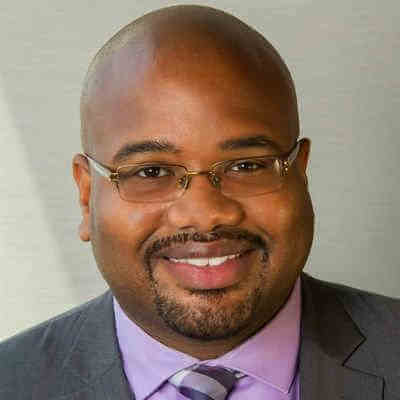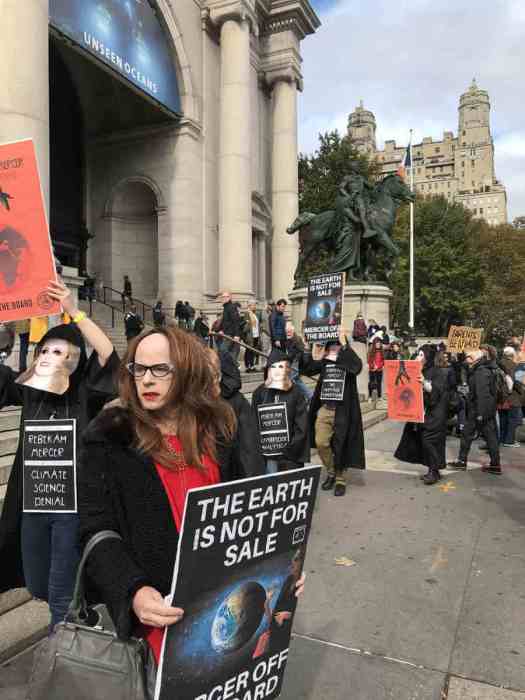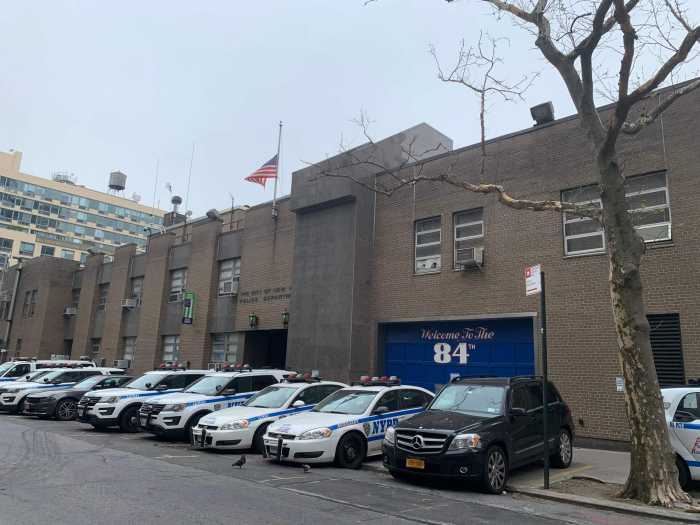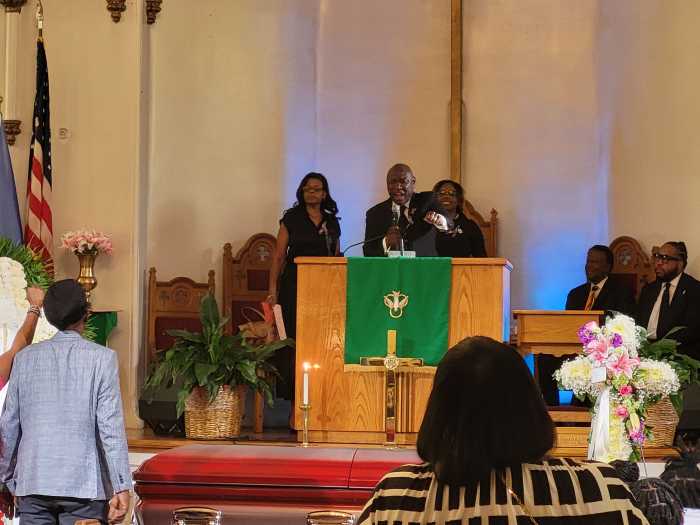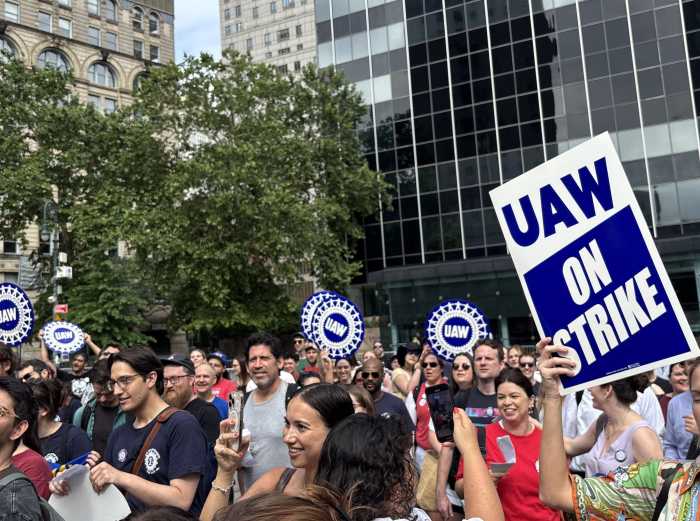SEIU 32BJ's Hector Figueroa flanked by CIty Councilwoman Gale Brewer and Speaker Christine Quinn at the March 29 paid sick leave press conference. | GAY CITY NEWS
Scarcely a week after City Council Speaker Christine Quinn told an audience of hundreds at an LGBT Democratic mayoral forum that she did not favor moving forward now on pending paid sick leave legislation, she announced a compromise measure to do just that at a March 29 City Hall press conference.
The announcement capped days of intense negotiations between Quinn, an out lesbian who represents the West Village, Chelsea, and Hell's Kitchen, and leading advocates for the measure.
“Throughout these negotiations I have always said that I was willing to listen and engage all sides,” the speaker said. “Because of deliberate, thoughtful, and at times hard-nosed negotiations, we now have a piece of legislation that balances the interests of workers, small business owners, and local mom and pop proprietors across this city.”
The legislation, which will take effect on April 1, 2014, will initially require companies with 20 or more employees to provide five days of paid sick leave. Over an 18-month rollout, that minimum threshold will be reduced to 15 employees. Even companies that are not covered by the legislation must, as of next April, allow their workers sick leave, paid or unpaid, of five days without repercussion on their employment status.
The original legislation proposed by West Side City Councilwoman Gale Brewer, on which Quinn had blocked a vote, put paid sick leave requirements on all businesses with five or more employees.
Under the compromise announced, employees must have worked for at least four months for their sick leave eligibility to kick in, and seasonal and work-study employees are not covered.
Manufacturing businesses will also be exempt from the paid sick leave requirement –– “due to the particular challenges of that sector,” Quinn said –– though workers at such companies will still have the right to five unpaid days off.
The law will be enforced by the Department of Consumer Affairs. In the Brewer legislation, the health department would have had enforcement responsibility. The change is a concession to concerns from small businesses, especially restaurants, that often complain of overzealous health inspectors.
“The DOH, for better or worse,” Quinn said, “is the agency that small businesses complain about most… Consumer Affairs, I think, has a better perspective on small business.”
Provisions in the Brewer legislation providing a legal right of civil action to employees against businesses not complying with the law has been eliminated in favor of a complaint process that will go through Consumer Affairs. A fact sheet released by Quinn’s office stated that the change prevents “a system that could allow for excessive and unsubstantiated lawsuits against business owners.”
Minimum fines have been reduced from $1,000 under the Brewer plan to $500, with the maximum lowered from $5,000 to $2,500.
Despite these modifications to the Brewer bill, advocates expect a veto by Mayor Michael Bloomberg, but with more than 40 supporters on the 51-member Council, an override is a foregone conclusion.
The speaker had explained her unwillingness to move on paid sick leave by pointing to the softness of the New York economy, and the legislation gives the city one last out on that score prior to implementation. If economic activity in the city is lower on January 1, 2014 than it was on January 1, 2012 –– as measured by the Federal Reserve Bank of New York’s Coincident Index –– the bill will not take effect next April. A spokesman for the Working Families Party (WFP), which had pressed Quinn hard on the legislation, said sick leave advocates were confident it would surmount that hurdle.
At the end of 2016, the city’s Independent Budget Office will examine the impact of the legislation, and advocates are hopeful that would provide an opportunity to extend the law to include businesses with fewer than 15 employees.
Quinn’s office and the WFP agreed that the legislative compromise would cover one million New Yorkers who currently get no paid sick leave.
Advocates responded with praise for the compromise legislative package.
Hector Figueroa, the president of SEIU 32BJ, a union of building services workers, said, “We… applaud Speaker Quinn for negotiating a bill that will give more than a million workers paid sick days and provide hundreds of thousands more with an assurance that they won’t have to choose between taking their child to a doctor and losing their job.”
Quinn singled out Figueroa for praise at the press conference.
WFP deputy director Bill Lipton termed the compromise bill “strong paid sick leave legislation.”
Brewer, who consistently said the speaker continued a dialogue with her over her proposed legislation even while declining to move forward, said, “After three years of non-stop advocacy and coalition building, I am pleased and grateful that we have reached a deal with Speaker Christine C. Quinn on my paid sick leave bill.”
Reaction from the business community was mixed, but generally reflected relief that the speaker had sought their input and modified the original proposal. Crain’s New York Business, in a March 28 story, quoted Kathy Wylde, president of the Partnership for New York City and a contributor to Quinn’s campaign, as saying, “We don’t support paid sick leave, period.”
In a written statement released at the City Hall press conference, however, she said, “Speaker Quinn made an especially bad bill a lot better after listening to the concerns of the business community.” Wylde cited the elimination of “a system of gotcha fines with a complaint-driven mechanism” and an implementation process that “protect[s] us in case of another economic collapse.”
At the press conference, two borough chamber of commerce leaders –– Jack Friedman of Queens and Carlo A. Scissura of Brooklyn –– offered praise for the compromise that was far less grudging.
“This once again shows that Christine Quinn is such an incredible leader,” Friedman said.
Quinn had come under increased pressure in recent months to move on paid sick leave but had remained firm in resisting a Council vote on Brewer’s bill. At last week’s LGBT mayoral forum, she said, “I support the concept of paid sick leave, but not this bill in its current formation. It’s not a question for me of if, it’s a question of when.”
Her rivals were aggressive during the forum in taking her on over the issue, with Bill Thompson, the former city comptroller, saying, “Speaker Quinn, you need to stop blocking this bill right now.”
Sal Albanese, a former member of the City Council from Brooklyn, noted that with a majority of members in support of the measure, Quinn was using the same tactic that Council leadership had employed in the 1970s and ‘80s to block a vote on the gay rights law.
Criticism of Quinn over the sick leave issue sparked spirited applause at the March 20 LGBT forum, but the tableau presented at City Hall on March 29 –– with the speaker surrounded by more than a dozen Council members, major labor leaders, and fired up members of both 32BJ and Make the Road New York, a social justice organization –– provided a striking contrast with the week before.
Two of Quinn’s three principal rivals for the Democratic mayoral nomination appeared prepared to give her a win on the sick leave issue. City Comptroller John Liu, congratulating advocates and Brewer, released a statement saying, “many more New Yorkers will soon be able to take care of themselves or a loved one who gets sick without risking their jobs or paychecks.” Thompson, in a tweet, wrote, “While it took political pressure to force her hand, I'm glad Speaker Quinn ended her 3-year, single-handed obstruction of #paidsick leave.”
Bill de Blasio, the city’s public advocate, however, was not mollified. At a City Hall press conference two hours after Quinn’s appearance, he said, “I think if you ask everyday New Yorkers if you want to wait a year or two for paid sick leave, they’ll say no. They can’t afford that. I think if you ask everyday New Yorkers is it okay that 300,000 New Yorkers go left out, they’ll say no.”
Nancy Rankin, the vice president for policy, research, and advocacy at the Community Service Society, a leading advocate for the legislation, said her group estimates that 350,000 workers will be left out of the bill as a result of increasing the threshold from five to 15 workers.
Quinn’s engagement in the negotiations that led to the compromise came as a dozen or so Council members had pledged to support a motion to discharge on Brewer’s legislation, a parliamentary move aimed at sidestepping Quinn’s opposition to allowing a vote. WFP was involved in those efforts and was left out of the negotiations with Quinn over the compromise package.
Quinn’s earlier recalcitrance on the issue had sparked criticism in progressive circles. Gloria Steinem, the longtime feminist leader, recently said she would withdraw her endorsement of Quinn if she did not move on paid sick leave. At the City Hall press conference, WFP’s Lipton read a letter from Steinem in which she “thank[ed] Councilmember Brewer and Speaker Quinn for hanging in there with countless women’s groups” and other advocates.
Last summer, a number of LGBT leaders –– including Dr. Marjorie Hill, CEO of Gay Men’s Health Crisis, Liz Margolies, executive director of the National LGBT Cancer Network, Melissa Goodman, an LGBT and reproductive rights attorney at the New York Civil Liberties Union, and Amber Hollibaugh, the co-director of Queers for Economic Justice –– told Gay City News they were strong backers of paid sick leave.
“We are a public health organization and so obviously committed to structures and policies that will promote public health,” Hill said. “And we are a social justice organization committed to equity for all.”





